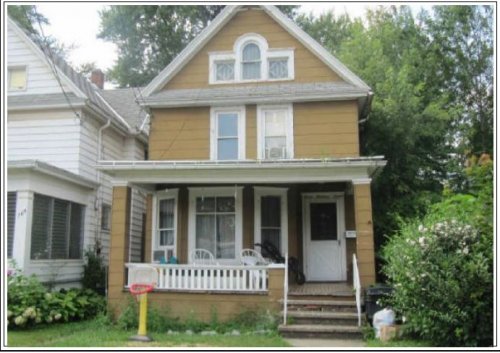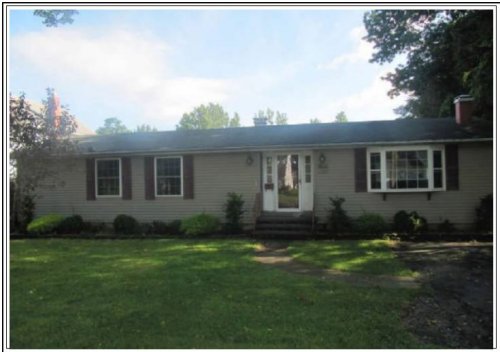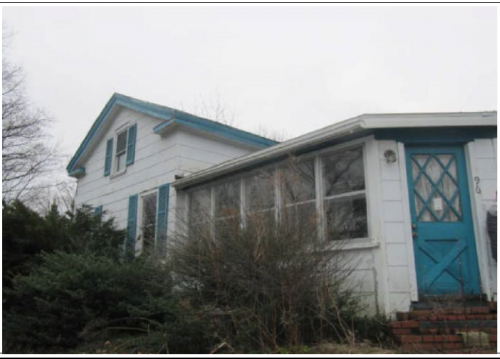From The Jamestown Post-Journal.
By the end of this year, the Chautauqua County Land Bank Corporation, in conjunction with county and municipal partners, will have demolished more than 100 condemned houses since its inception in 2012.
Mark Geise, land bank executive director, and Gina Paradis, land bank administrative director, said since they started the job of promoting strong neighborhoods and vibrant communities by addressing blight, improving property values and transforming troubled properties into useful assets, they have assisted in demolishing more than 40 properties. Currently, there are 25 more in the process with 55 more demolitions planned by the end of the year.
To go along with removing blight, the land bank has acquired almost 50 properties, primarily through the tax foreclosure process, with the focus of rehabilitating the house to get the parcel back on the tax rolls. Since 2012, land bank officials have sold 42 properties, with 12 rehabilitation projects completed and 30 in the process of being renovated. By doing this, nearly $1.3 million in private investment has been made in communities throughout the county. Also, 26 side lots have been acquired by the land bank or have resulted from demolition projects, with 16 being sold and returned to the tax rolls.
”One doesn’t need to go far to realize that blighted and abandoned properties plague our communities and their negative influence results in dilution of the real estate market, increased crime, incurred public expenses, neighborhood disinvestment and a general lack of pride in our neighborhoods,” Geise said. ”It has been widely recognized that the tax foreclosure process, which results in the sale of marginal to poor properties to the highest bidder, doesn’t typically result in an optimal outcome. Across the nation, states and communities have recognized this shortcoming and have advocated for the creation of land banks as a viable alternative or addition to the county auction of real property and land banks are proving to be successful tools in combating community blight.”
The creation of the county land bank started in 2011. After three years of building a network of supporters across the state, Assemblyman Sam Hoyt and state Senator David Valesky recognized the utility of land banks and were the primary bill sponsors that led to saw the state Land Bank Act being signed into law by Gov. Andrew Cuomo, Paradis said. The original legislation allowed for the creation of up to ten land banks in the state through a competitive application process managed by the Empire State Development Corporation. A bill introduced in the spring of 2014 by Attorney General Eric Schneiderman to increase the number of potential land banks from 10 to 20 was passed immediately and unanimously by both chambers, and approved in June 2014.
”The New York State Land Bank Act allows for ‘foreclosing governmental units’ or local governments who collect and foreclose on property taxes to create land banks,” Paradis said. ”As outlined in the legislation, land banks are created by the local government, are local public authorities and operate as independent nonprofits acting in the public interest.”
Geise said the state act grants special powers and legal authorities to land banks, such as obtaining properties at low or no cost through the tax foreclosure process; the right of first refusal to purchase properties being sold after tax foreclosure; holding land tax-free; clearing title and/or extinguishing back taxes; leasing properties for temporary uses; and negotiating sales based not only on the highest bid but also on the outcomes that most closely align with community needs.
In an effort to implement recommendations from the county’s comprehensive plan, Chautauqua County pursued the creation of a county-wide land bank, with the goal of being selected in the first round of designations by the state and to act as a model for developing and utilizing land banks in rural areas, Geise said. The objective for the county land bank is to create a countywide, State-designated land bank to control and manage strategically selected dilapidated residential and commercial properties acquired through the county’s tax foreclosure process. The land bank will seek to minimize the negative impacts that substandard properties and structures have on communities, thereby stabilizing neighborhoods and Main Streets alike.
”In May 2012, Chautauqua County Land Bank Corporation, along with four other land banks in New York State, were approved by Empire State Development as one of the first state land banks. Since its inception, the Chautauqua County Land Bank has been awarded seed funding from the county and secured two separate grants from the state Office of Attorney General totaling $2.86 million,” Geise said. ”This outside funding is being allocated primarily towards activities related to demolition, side lot disposition, acquisition of bank foreclosed properties, administration and marketing. Sales of properties contribute to the bottom line by providing funding to pay for staff and other overhead expenses.”
The land bank is comprised of Geise; Paradis; Jen Cameron, a part-time program specialist; and a 11-member board of directors consisting of volunteers representing a cross-section of community stakeholders who meet once a month. Paradis said the primary programs the land bank administers to service the county are the property rehabilitation program, residential and mixed-use demolition program, and a side lot program.
”We acquire the properties through the tax foreclosure process, purchases bank foreclosed properties and accepts the donation of properties. In a nutshell, the property rehabilitation program provides properties for sale to the public at 60 percent of the as-is appraised value, thereby leaving room for needed upgrades and obligates purchasers to follow through on their rehabilitation promises through a legal contract with the land bank,” she said. ”The demolition program provides funding to municipalities and directly contracts for the removal of dilapidated residential and mixed-use properties. The side lot program sells vacant lots to adjacent property owners at a highly-discounted cost.”
Geise said the land bank will continue to work with the state, the county, local municipalities, housing agencies, stakeholder groups and the public to provide its existing services and will look to expand its offerings as it evolves.
”The land bank is grateful for all of the support it has received from the County Legislature, the County Executive’s Office and other community partners, and looks forward to another challenging and successful year,” Geise said.
For more information, visit chautauqualandbank.org or contact Geise or Paradis at 969-7843.









